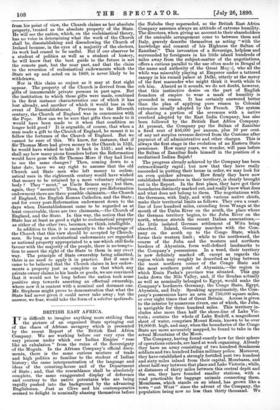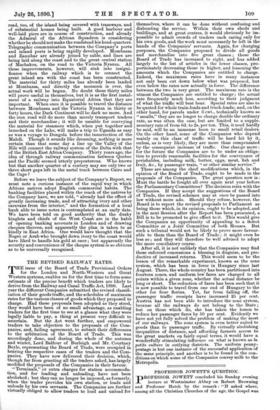I T is difficult to imagine anything more striking than toria
; contains the whole of Lake Rudolf, a magnificent the picture of an organised State springing out sheet of water, comprises Mount Kenia, known to be over of the chaos of African savagery which is presented 18,000 ft. high, and may, when the boundaries of the Congo by the recent Report of the British East Africa State are more accurately mapped, be found to take in the Company. We see working before our very eyes the actual Mountains of the Moon. from his point of view, the Church claims as her absolute the Nabobs they superseded, so the British East Africa property, treated as the absolute property of the State. Company assumes always an attitude of extreme humility. He will see the nation, which, on the ecclesiastical theory, The directors, when giving an account to their shareholders has no voice in determining what the work of the Church of the amicable arrangement come to between them and shall be, disestablishing and disendowing the Church of Italy, gravely describe themselves as acting " with the Ireland because, in the eyes of a majority of the electors, knowledge and consent of his Highness the Sultan of its work had ceased to be useful. But if our observer be Zanzibar." This invocation of a Sovereign, helpless and a student of politics as well as a student of history, surrounded by foreigners in his little island hundreds of he will know that the best guide to the future is not miles away from the subject-matter of the negotiations, the remote past, but the near past, and that the claim offers a curious parallel to the use often made in Bengal of to the reversion of ecclesiastical endowments which the the name and authority of the Great Mogul, who all the State set up and acted on in 1869, is never likely to be while was miserably playing at Emperor under a tattered withdrawn. canopy in his ruined palace at Delhi, utterly at the mercy Nor is this claim so unjust as it may at first sight of the first marauder who might think it worth while to appear. The property of the Church is derived from the rob him. Absurd as it sounds, we do not doubt, however, gifts of innumerable private persons in past ages. But that this instinctive desire on the part of English the institution to which these gifts were made, combined founders of empire to wear a mask of humility is in the first instance characteristics one of which it has grounded in reason. It has certainly answered better lost already, and another of which it would lose in the than the plan of applying pure reason to Colonial event of Disestablishment. Previous to the fifteenth extension usually adopted by the French. The system century, the Church of England was in communion with of sharing a portion of the revenues with a native the Pope. How can we be sure that gifts then made to it overlord adopted by the East India Company, has also would have been made to it when that condition no been followed by the British East Africa Company. longer held good ? It is arguable, of course, that when a At present, the Company pay the Sultan of Zanzibar man made a gift to the Church of England, he meant it to a fixed rent of $56,000 per annum, plus 50 per cent. follow the fortunes of the Church of England. But we of any net surplus revenue derived from the Customs after cannot be sure of this. We know, for instance, that if payment of all administrative and other charges. This is Sir Thomas More had given money to the Church in 1525, always the first stage in the evolution of an Eastern State he would have wished to take it back in 1535 ; and who pensioner. How many years, we wonder, will pass before shall say how many pious founders before the Reformation the Sultan of Zanzibar finds himself in the position of a would have gone with Sir Thomas More if they had lived mediatised Indian Rajah?
to the interior by numerous rivers, one of which, the Juba, is navigable for three hundred miles. This territory in- BRITISH EAST AFRICA. eludes also more than half the shore-line of Lake Vic- read, too, of the island being covered with tramways, and of substantial houses being built. A good harbour and well-laid piers are in course of construction, and already the Admiral of the African Squadron is considering whether he should not make the roadstead his head-quarters. Telegraphic communication between the Company's ports and inland posts is being rapidly developed. Mombassa and Zanzibar are already joined by cable, and lines are being laid along the coast and to the great central station of Machakos, on the road to the Victoria Nyanza. All these improvements, however, will sink into insigni- ficance when the railway which is to connect the great inland sea with the coast has been constructed. The material for thirty miles has already been landed at Mombassa, and directly the monsoon is over, the actual work will be begun. No doubt these thirty miles will prove useful in themselves, but it is as the first instal- ment of a railway into Equatorial Africa that they are important. When once it is possible to travel the distance between Mombassa and the Victoria Nyanza in thirty or forty hours, the Dark Continent will be dark no more. And the iron road will do more than merely transport traders and their merchandise ; it will be useable for conveying the material for steamers which, when put together and launched on the Lake, will make a trip to Uganda as easy as was a voyage to Dongola before the insurrection of the Mandi. Though it sounds like dreaming, nothing is more certain than that some day a line up the Valley of the Nile will connect the railway system of the Delta with that of the British East Africa Company. Thirty years ago, the idea of through railway communication between Quebec and the Pacific seemed utterly preposterous. Who knows but that another quarter of a century may see only two or three short gaps left in the metal track between Cairo and the Cape ?
Before we leave the subject of the Company's Report, we must note a, curious instance of the rapid way in which African natives adopt English commercial habits. The banking facilities placed within the reach of the natives by the Company have, we are told, " already had the effect of greatly increasing trade, and of attracting ivory and other caravans from the interior," and the formation of a local bank able to issue notes is contemplated at an early date. We have been told on good authority that the dusky kinglets and chiefs of the West Coast are in the habit of opening banking accounts in London and of drawing cheques thereon, and apparently the plan is taken to as kindly in East Africa. One would have thought that the Negro or Arab who brought down ivory to the coast would have liked to handle his gold at once ; but apparently the security and convenience of the cheque system is so obvious as to be universally recognised.



































 Previous page
Previous page